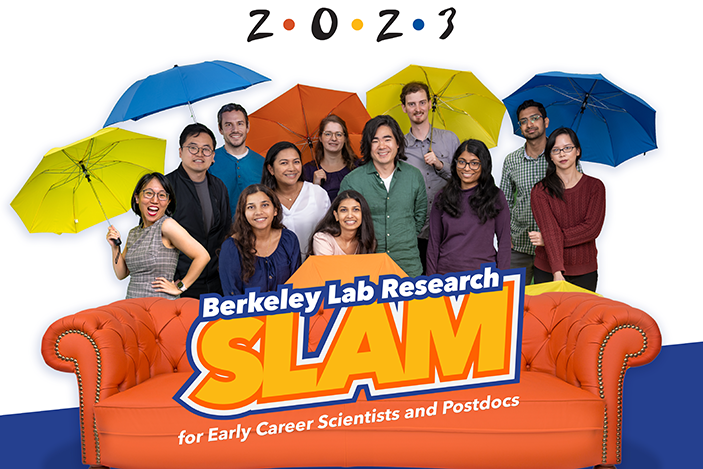What was the genesis of the Research SLAM? Why did it start and what were the goals?
I started at the Lab in 2017 as the Postdoc Program Manager and in my second week attended a UC-wide Postdoc Office meeting. In that meeting, UCSF had talked about their Postdoc SLAM and what a fun and enriching experience it was for Postdocs. They had asked if other UCs would consider hosting their own SLAM.
I loved the idea and started to explore whether Berkeley Lab could host one. In my research, I talked to UCSF and Lawrence Livermore National Lab about their processes. In August of 2017, I pitched the idea to Horst Simon, our former Deputy Director for Research, and other stakeholders that we host a SLAM starting in 2018. The entire group was extremely enthusiastic about the idea and the response was, “what do you need from us to make this happen?”
What is the inspiration behind the SLAM’s format?
We took the best of both worlds modeling after UCSF and LLNL’s Postdoc SLAMs. Participants are employees of the Lab who have received their Ph.D. within the previous six years.
We of course added in some new elements. In my biased opinion, the best addition was adding our co-emcees, David Gilbert (retired Sr. Communications at JGI) and Staff Scientist Sinead Griffin. Both have now retired as SLAM emcees, but we plan to continue on with SLAM Alumni returning as emcees.
How has the SLAM evolved or changed over the years?
In 2018, our first year, people had asked “what is a SLAM?” By the second year it was as if everyone knew what a SLAM talk was, and now it’s just part of the Lab culture. In 2019 we had a packed house with standing room only in the Building 50 Auditorium. In 2020, our virtual SLAM had over 500 attendees. Really, we have refined the process over time. Our SLAM trainer, renowned speaker, Jean Luc Doumont has been working with us since the first SLAM. He has worked with all of the finalists over the years. We now have sixty SLAM Alumni!
The SLAM has been the inspiration for many other events at the Lab and in the Areas such as the Elemental Slam on Capitol Hill, Energy Storage Summit Pitchfest and BioEpic SLAM.
In 2021 the SLAM expanded into a Bay Area SLAM. I was at an event with my LLNL colleague, Christine Zachow and had asked if she had any interest in doing something like this. Next thing I knew, LLNL approached Sandia and I had recruited the Stanford Linear Accelerator and we started to organize the first Bay Area Research SLAM. Berkeley Lab was the initial host for the first-ever Bay Area Research SLAM (BARS) in October 2021, which took place virtually. LLNL hosted the second BARS and first-ever in person. On October 5 of this year, our top 3 winners from this year’s competition will be headed to SLAC to vie for best presentation among the other Labs’ competitors.
And now there is a National Lab SLAM this year. What was Berkeley Lab’s role in that area-wide expansion?
In the very beginning of our collaboration with BARS, there was sort of joking and sort of serious talk about how great it would be to host a complex wide Research SLAM among all 17 DOE National Labs on Capitol Hill. I started to socialize the idea with LBNL leadership and had nothing but their support. I approached my LLNL colleague again, Christine Zachow, and she agreed to pursue this endeavor with me.
What is next for the SLAM?
I would like to see the SLAM sustain its momentum and interest. It has proven to help early career researchers develop an invaluable skill that they will be able to take with them for the rest of their careers no matter what industry they end up working in, be it private industry, national labs, academia, or non-profits. Communicating science to a non-specialist audience is a critical skill to have.
I am also excited to see the National Lab Research SLAM become a reality. It feels like this was the end goal all along. I hope to see this not just be a one-off but an event that folks look forward to on a recurring basis. It will be held on November 15 at 4:30 p.m. ET on Capitol Hill and live-streamed to a public audience. Jean-luc Doumont, who is our resident trainer, will be emcee for the event.
I don’t think we can measure all of the benefits of the National Lab SLAM yet. However, I am most excited to see our early career researchers and our Labs promoted to a public audience, raising awareness about the critical work that DOE national labs do. I am also excited to see the early career researchers have the opportunity to network across the multiple Labs and with Members of Congress and their staff.
The 2023 Berkeley Lab Research SLAM takes place on September 21 from 3-5 p.m. in the Building 50 auditorium and virtually on streaming.lbl.gov.
Resources
Berkeley Lab Research SLAM
Bay Area Research SLAM
National Lab Research SLAM
Berkeley Lab Postdoc Association
Career Pathways Office
